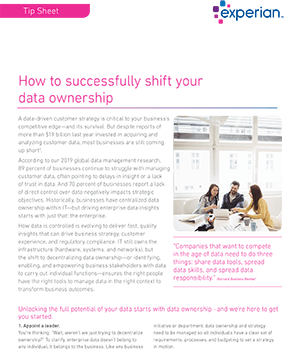- Products

Enjoy a free 30-day trial of our
data validation software.Experience the power of trusted data
solutions today, no credit card required! - Solutions

Enjoy a free 30-day trial of our
data validation software.Experience the power of trusted data
solutions today, no credit card required! - Partners

Enjoy a free 30-day trial of our
data validation software.Experience the power of trusted data
solutions today, no credit card required! - Learn more
- Pricing
- Contact Us
How to successfully shift your data ownership
A data-driven customer strategy is critical to your business’s competitive edge—and its survival. But despite reports of more than $19 billion last year invested in acquiring and analyzing customer data, most businesses are still coming up short1.
According to our 2019 global data management research, 89 percent of businesses continue to struggle with managing customer data, often pointing to delays in insight or a lack of trust in data. And 70 percent of businesses report a lack of direct control over data negatively impacts strategic objectives. Historically, businesses have centralized data ownership within IT—but driving enterprise data insights starts with just that: the enterprise.
How data is controlled is evolving to deliver fast, quality insights that can drive business strategy, customer experience, and regulatory compliance. IT still owns the infrastructure (hardware, systems, and networks), but the shift to decentralizing data ownership—or identifying, enabling, and empowering business stakeholders with data to carry out individual functions—ensures the right people have the right tools to manage data in the right context to transform business outcomes.
Unlocking the full potential of your data starts with data ownership—and we’re here to get you started.
1. Appoint a leader.
You’re thinking: “Wait, weren’t we just trying to decentralize ownership?” To clarify, enterprise data doesn’t belong to any individual, it belongs to the business. Like any business initiative or department, data ownership and strategy need to be managed so all individuals have a clear set of requirements, processes, and budgeting to set a strategy in motion.
This leader is likely your chief data officer, and if you do not have one, you can appoint your chief technology officer or a department head that is passionate about data. He or she must establish why your business should invest in data quality and tie it to strategic objectives such as customer experience, efficiency, or growth. They must also be the bridge between IT and the business, aligning the data technology and infrastructure with the business goals. This person is your data advocate and leads the strategic vision, invests in the right tools, and identifies and assigns roles.
2. Identify your movers and shakers.
Your appointed champion needs to define the right individuals across the enterprise who should access and control the data: your data owners. Data owners are the stakeholders who live and breathe data as part of their day-to-day activities, and they rely on meaningful data directly tied to strategic business objectives.
Who in your business needs control of mission-critical data? Consider representatives from accounting, senior VPs, process or application owners, project managers, and your subject matter experts, such as marketing or compliance, to start. Ultimately, your data owners are the go-getters that set the wheels in motion for successful decentralized data ownership.
3. Invest in the game-changing technology.
Your technology investment can make or break your data ownership strategy. The tools you choose must help your appointed leader and data owners manage their data, and most importantly, connect the dots to align with the business needs. Empowering non-IT data owners with easy-to-use tech is a critical step to ensuring enterprise-wide data ownership, and 43 percent of organizations cite this is the top requirement. Scope out whether the core functionality is intuitive, agile, and user-friendly and able to overlay business context to leverage business insights.
Data management is a team effort. Building your team of data advocates from across your business will give you the competitive edge you need to stay ahead of the game.
1 Goldberg, Laura. “U.S. Firms Spend Nearly 19.2 Billion on Third-Party Audience Data & Data-Use Solutions in 2018, up 17.5% from 2017.” Business Wire. December 5, 2018.
2 Jonathan Cornelissen. “The Democratization of Data Science.” Harvard Business Review. July 27, 2018.
